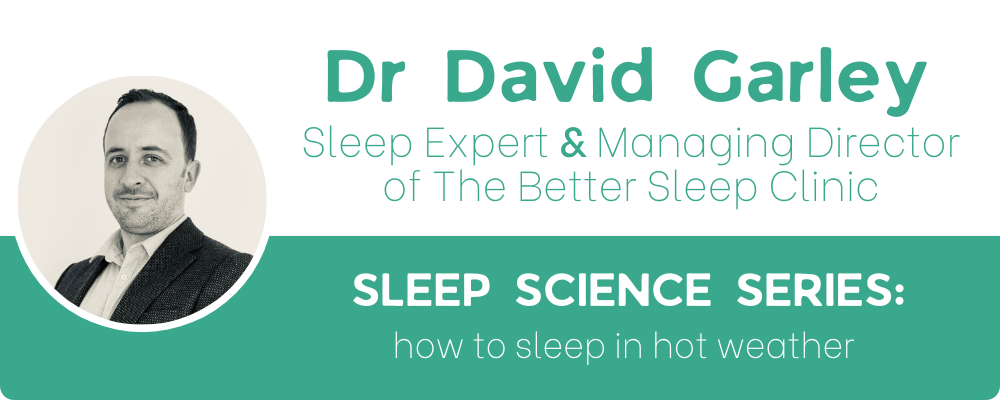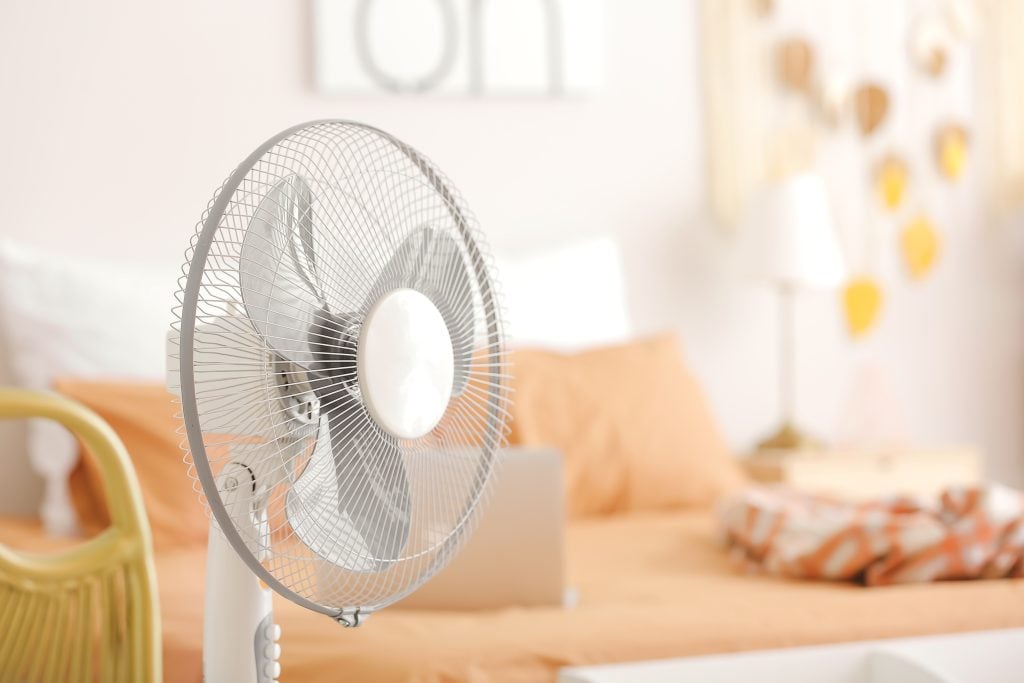
Sleeping in the heat can be so tricky. When it’s cold, things are a little uncomfortable – but if you stay still and warm the bit of the bed you’re in, you’ll eventually drift off. But when it’s too hot, it’s an entirely different ball game! Why does heat make such a difference? Our latest blog, written by Dr David Garley, provides some valuable tips on how to sleep during the warmer days of the year.
There are two main issues people have with sleeping in the heat. Firstly, it’s just plain uncomfortable, which can keep you up. And secondly, one of the main ways that sleep is controlled is by your internal body clock, known as the circadian rhythm.
The circadian rhythm has a wake phase and a sleep phase. Transitioning from wake to sleep is associated with a drop in your core body temperature of 0.5-1.5C. So, if your sleeping environment is piping hot, you’ll find the transition into sleep a bit more challenging.
In the UK, this is often quite a temporary issue, mainly around heatwaves in summer. Looking globally at hot countries, you can see how people have adapted to this problem. One thing you may have noticed is that homes are sometimes painted white to reflect the heat or have lots of ventilation and, therefore, are designed to withstand high temperatures. On the other hand, houses in the UK are traditionally made to hold heat in.
Sleep is also often different in hot countries due to behavioural adaptations. When the noon-day hours are so hot, it can be impossible to work outside. These periods can be used instead for a sleep period, as in the siesta. Finding a cool place for a short sleep means you can afford to go to bed later for your main sleep when it is generally cooler. This also means you can get up earlier to be productive outside before the temperatures get too hot.
This sleep pattern is known as biphasic when your daily sleep requirements are divided into two sections: usually, one smaller section during the day, followed by a longer main section at night.
We can learn a lot from these cultures about hot temperatures in the UK (or even when on holiday in a hot country).
One of the best ways to sleep better in the heat is to try to reduce the temperature; detailed below are a few ways in which this can be achieved:
This process is best started early in the day. If you have a side of your house or flat that gets a lot of sun, keep the curtains drawn to prevent the greenhouse effect from warming your house throughout the day. Trying to keep lights off where possible will also reduce the temperature.
When you come to sleep, opening your window, especially if you can get hold of a fan, can help circulate air and exchange stuffy bedroom air for cooler outside air.

Bed covers can make a huge difference. Often in the UK, we keep the same covers all year round, but this can make summer sleeping just too hot. Instead, opt for a lighter summer duvet with a low tog rating or choose layers so that these can be stripped off or put back on during the night to better control your temperature and sleep environment.
Sleeping without any covers can feel unnatural, so taking the duvet out and using just the duvet cover can keep you a bit cooler whilst retaining familiarity.
Alternatively, some people advise dampening your bed cover as this can help transfer heat away from your body, particularly during the first part of the night. However, don’t wet the cover too much, as this may make the room humid.
Some mattresses, such as gel foam or latex options, are designed to keep you cool during the night. These mattresses allow air to circulate in the top layer, or in the case of gel foam mattresses, use gel to wick heat away from the body.
Some people try to cool themselves down before they get into bed, but do this with a short, warm shower rather than a cold one, and this is again for two reasons.
Firstly, a cold shower is quite a bracing experience and probably not what you want when you’re preparing for sleep. Secondly, a short, warm shower will trick your body into thinking it’s hot and divert more blood to your skin, so your skin will be flushed, but this is your body’s natural way of cooling yourself down.
This is a tricky one. If there is a prolonged heat wave and you’re struggling to sleep, a short nap can help make you feel more awake and energised during the day, especially if you feel lethargic.
However, a nap should last at most 20 minutes, as when you’re awake, you’re always building something called sleep pressure—the longer you are awake, the sleepier you feel. If you are struggling to get to sleep at night, a high level of sleep pressure can help. On the other hand, sleeping for substantially longer than 20 minutes reduces that sleep pressure.
But what about the Mediterranean, where people have a siesta?! The bi-phasic sleeping pattern, described earlier, can take a bit of practice and is often built into a culture. In the UK, we don’t generally have prolonged hot spells, so by the time you have successfully managed this, it will probably be cold again! Developing this routine might disrupt your sleep in the medium and long term. However, a short nap of around 20 minutes may be a good idea.
Extending your bedtime builds on the point above; if you go to bed a little later, you will have higher sleep pressure and be more likely to fall straight to sleep. It will also be cooler an hour or so later in the night.
Ensure you look after yourself during the day—stay well hydrated and avoid too much sun if possible. You don’t want to try and sleep when you’re dehydrated or have sunstroke. Also, as great as it can be to enjoy a tipple when the sun is out, try not to drink too much alcohol. Excessive alcohol may lead to fragmented and poor-quality sleep as well as dehydration.
Not being able to sleep is one of the most annoying things in the world. You may initially not sleep because of the heat, but if you get frustrated, you may find this is even more of an obstacle to falling asleep than the heat itself.
Humans are pretty robust creatures and can deal with a few nights of poor sleep, but they still usually manage okay. Follow the usual good advice for sleeping – if you find you’re not asleep after around 20 minutes or so, then stop trying! Give yourself a break, pop into another room and find a relaxing and distracting activity while waiting for the urge to sleep to return. And when it does, hopefully, it’ll also be a little cooler!
If you would like more advice on how to improve your sleep, then please visit us at www.thebettersleepclinic.co.uk
